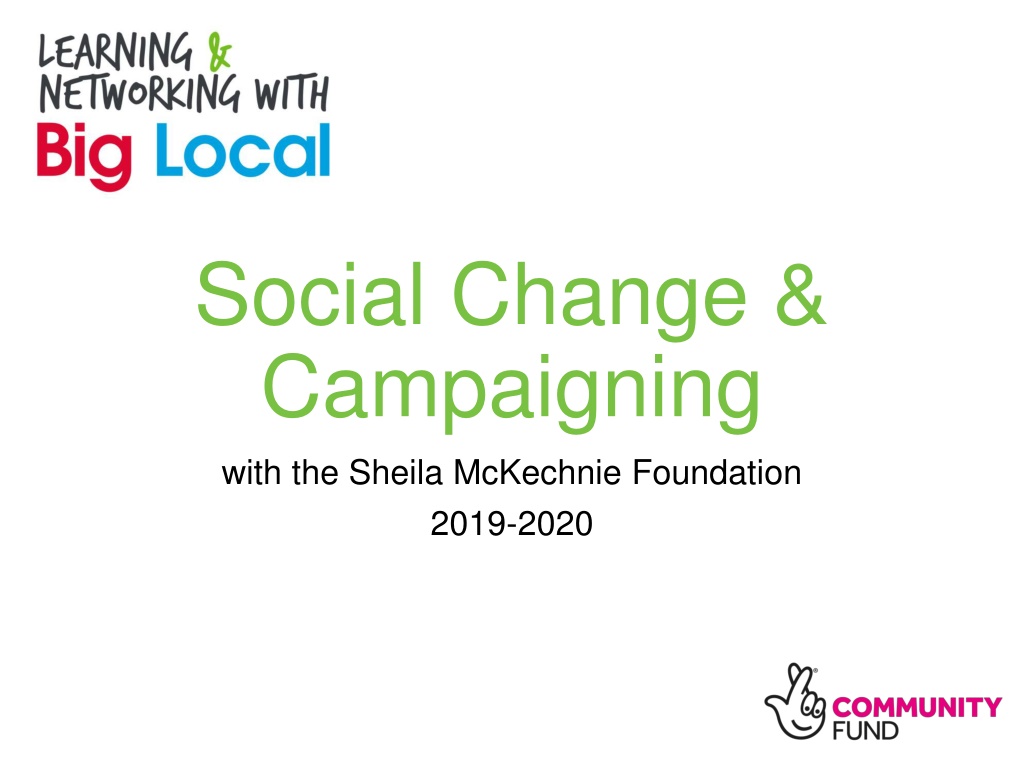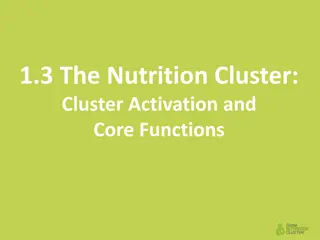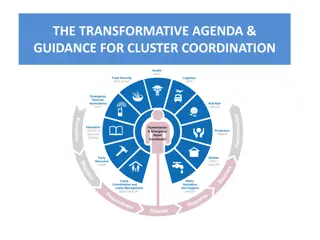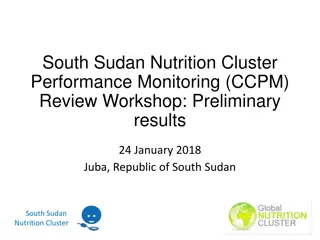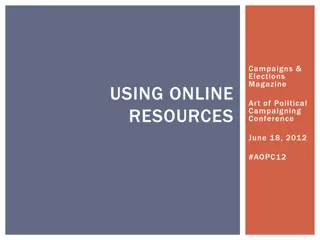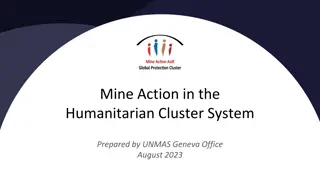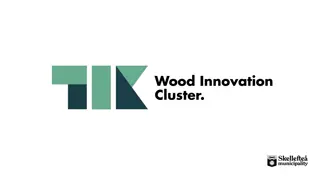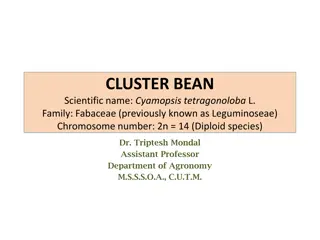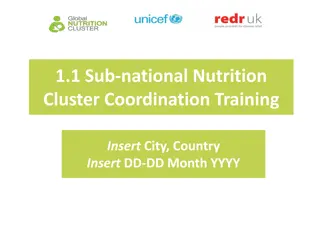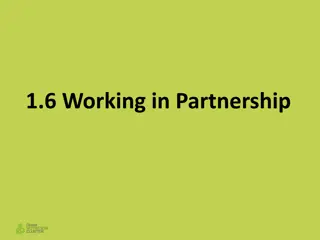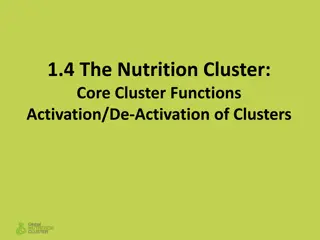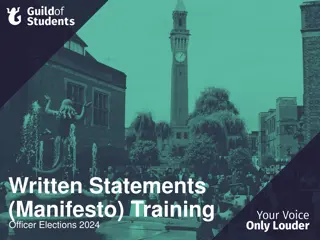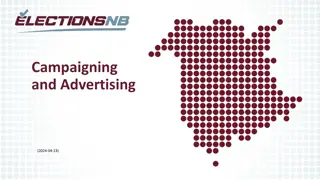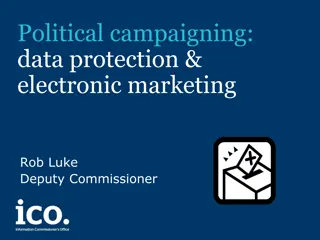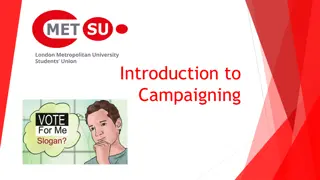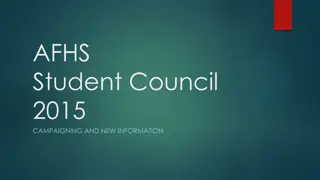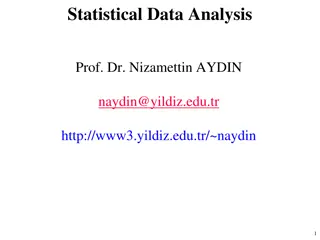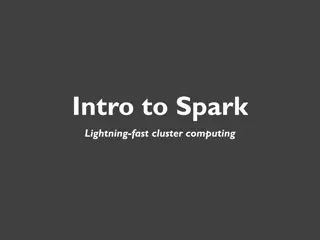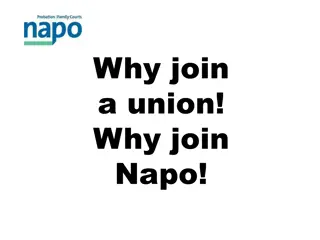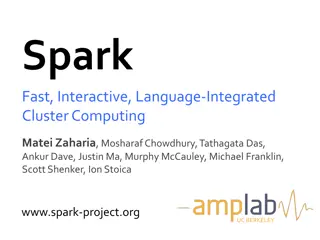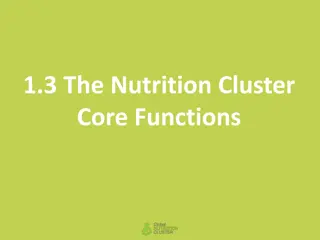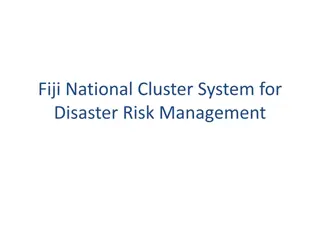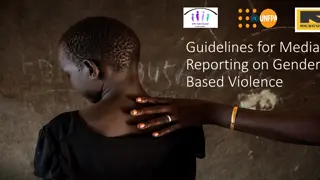Exploring the Social Change & Campaigning Learning Cluster
This slide deck explores the Social Change & Campaigning Learning Cluster conducted by the Sheila McKechnie Foundation. It delves into the aims of the cluster, participants, new skills acquired, and next steps. The learning clusters were designed to go beyond one-day events, providing residents with an opportunity to deepen their understanding of social change and campaigning. The cluster aimed to equip participants with the knowledge and skills to effectively campaign in their local areas and engage with decision-makers to drive meaningful change.
Download Presentation

Please find below an Image/Link to download the presentation.
The content on the website is provided AS IS for your information and personal use only. It may not be sold, licensed, or shared on other websites without obtaining consent from the author. Download presentation by click this link. If you encounter any issues during the download, it is possible that the publisher has removed the file from their server.
E N D
Presentation Transcript
Social Change & Campaigning with the Sheila McKechnie Foundation 2019-2020
Contents In this slide deck you will find: What the Social Change & Campaigning Learning Cluster is Aims of the cluster Who took part What we learnt New skills & knowledge Next steps for participants Points for further discussion Links to extra resources: guides, tools, podcasts
About Big Local learning clusters Learning clusters were developed so that a group of residents from across Big Local areas could go beyond the limits of a one-day event, meeting several times over the course of a year to get to know each other better and go deeper into a topic whether this is a specific theme or skill. Clusters are designed to combine peer learning and inspiring stories from participants with guidance from experts who could take learning to the next level. Lessons can also be shared with partnership members and other communities who do not attend, contributing to improved understanding of a topic area.
About the Social Change & Campaigning Learning Cluster SMK were invited to run a workshop at a Big Local event in June 2018, introducing social change and campaigning to the local groups. The session was well attended and there was a clear appetite for more support on this theme. Subsequently the Local Trust decided to run a learning cluster on Social Change and Campaigning. The Learning Cluster ran for five days between February 2019 and January 2020. It introduced SMK s social power model and built participants knowledge and skills in key areas they would need to press for transformative social change.
Developing the cluster Local Trust listened to Big Local groups about what areas they wanted support in. They said it should address how partnerships can inspire and encourage other people to take action, whether that s other people and organisations within an area or policy makers and elected officials. SMK also conducted telephone interviews with those who signed up to the Learning Cluster, which informed the final programme design.
Aims of the cluster 1. Groups will understand social change and how it happens Groups will have the confidence, knowledge and skills to campaign effectively in their local area Participants will be able to engage with the wider community and decision makers effectively to achieve change in their area Participants will have clear plans and strategies which lead to action being taken in their area 2. 3. 4.
Cluster participants Big Local area Region Aberfeldy London Barrowcliff Yorkshire and the Humber Big Local Broad Green London Bradley North Yorkshire Collyhurst North West Conniburrow South East Keighley Valley Yorkshire and the Humber Newington, Ramsgate South East Selby Town North Yorkshire SO18 South East William Morris London Woodland Speaks Yorkshire and the Humber
What we learnt Strategy: how change happens, our right to make change and the tools we can use to plan Influence: getting under the skin of decision- makers, ways to engage with power, mobilizing communities & building alliances Spreading the word: the power of stories, understanding who our audiences are, and using personal experience Keeping up momentum: setting goals, keeping our own energy up and developing our own voices
Meeting 1: strategy How change happens: including the Social Change Grid Campaigning & compliance: being confident in your right and legitimacy to campaign for change Tools to plan your strategy: identifying problems, solutions, and opportunities, setting objectives, planning for flexibility 27 & 28 February 2019, London Trainers: Sue Tibballs (SMK Chief Executive) and Chloe Hardy (SMK Director of Policy & Communication) Guest speakers: Cllr Catherine Rose (Campaign to Save Dulwich Hamlet FC) & Lucie Russell (Joseph Rowntree Foundation)
Meeting 2: influence Influencing decision-makers, local or national: what motivates them? Different ways to engage with decision-making: formal, legal, partnership, public, disruptive Mobilising communities and engaging partners Making your face-to-face meetings count Building alliances 7 June 2019, York Trainer: Chloe Hardy (SMK) Guest speakers: Tom Chigbo (Leeds Citizens) and Emma Burnell (Political Human)
Meeting 3: spreading the word The power of stories: stories versus messages Audiences & framing Personal stories: keeping ownership of your story, using others stories with respect Your Big Local story: the elements of a story (ordinary world, villains, allies, call to adventure, better world) 8 November 2019, Manchester Trainer: Chloe Hardy (SMK) Guest speakers: Elaine Lovell (Hilltop & Caldwell Big Local), Ryan Herman (Local Trust), Jessie Powell (Local Trust), Tom Chigbo (Leeds Citizens)
Meeting 4: keeping up momentum Turning your local stories into reality Setting your change goals Keeping up momentum Looking after yourselves - keeping your spark Getting your voice heard developing your personal speaking style 17 January 2020, London Trainer: Chloe Hardy (SMK) Guest speaker: Viv Groskop
Lesson 1: People have the right & ability to determine their future Power does not sit solely in the hands of decision-makers. By organising locally, finding allies, building awareness and support, and marshalling evidence, local people can affect decisions or find alternative solutions. You have the right to work on political issues and decisions, so long as you are not partisan. Don t support or promote a particular party through your Big Local. Before, I would have thought of political campaign [when asked what campaigning is] but now I know it s about different ways and routes to achieve change in many areas.
Lesson 2: Keep your tools sharp There are lots of ways to make change experiment and find the ones that work for you. New ideas and approaches are constantly emerging keep your ear to ground and regularly remind yourself of the possibilities. What was wrong yesterday may be right today. You don t have to be an expert, just willing to give things a try. Practice is your friend and there are as many lessons in failure as in success. "We [this participant and others from her Big Local group who took part] understand better how to approach people and problems."
Lesson 3: Relationships are paramount Every decision-maker is a person. They have motivations just like everyone else. So, the more you know them or know about them, the better your chance of understanding them. Your strongest tool for change is empathy. Put yourself in someone else s shoes and try to imagine what and who drives their decisions. Use that to shape your campaigning. Every relationship begins with a conversation that means sharing something about yourself that will help them to understand you too. [We] sat down and spoke with our local councillor we would not have done that before
Lesson 4: Pick your battles based on your long-term vision The clearer you are about the future you are working towards, the easier it will be to pick the battles you want to fight. Truly transformative change is messy, and there s rarely a single way to achieve it. Having a long-term vision will help keep you on track. Review your priorities regularly change can take time so persistence is an advantage. But what was vital last year may not be next year. Are your efforts still focused on the best goals? It made us see we can have an influence. Don t just moan, go along with solutions and answers to questions. We know how to have a plan we were trying to campaign before but now we are actually doing it.
New skills & knowledge Three themes emerged when Learning Cluster participants were asked: What is the most useful or interesting thing you know now that you didn t know before participating in the programme? Theme 1: Target the right person or people Always reach out to local vicars because you re part of their flock and they will want to help you. Targeting key people rather than speaking to everyone.
New skills & knowledge Three themes emerged when Learning Cluster participants were asked: What is the most useful or interesting thing you know now that you didn t know before participating in the programme? Theme 2: Speaking skills I learned that going up on a high note [when one speaks] is common but [it is important to] end on a low note to be taken seriously. I m conscious of how I speak now and am using [that tip] a lot. How to stand in front of people, how to talk, how to present yourself to people.
New skills & knowledge Three themes emerged when Learning Cluster participants were asked: What is the most useful or interesting thing you know now that you didn t know before participating in the programme? Theme 3: The importance of lived experience ...with the right support you can make [lived experience] really powerful. The importance of lived experience and telling personal stories. I knew they were important but realising you can t contest it helped me think a different way.
Next steps for participants Take steps to ensure you can keep up your own energy. Develop the relationships you need: with local people, decision-makers, service providers, businesses. Regularly discuss and review your change objectives: are they still relevant and is your strategy still effective? Make a note of the skills and knowledge you want to develop this year, and ask someone to hold you to it. Stay in touch with other Big Locals: if the buddy system worked for you, keep it going.
Further discussion Do you regard what you do (or part of what you do) as campaigning? Are you comfortable with the idea that local people can drive change both by creating local services but also by influencing decision-makers? Read Social Power by the Sheila McKechnie Foundation, which explores how transformative social change happens and how it involves all kinds of action not just lobbying politicians Can you tell a strong story about how your area can (and will!) change?
Social Change & Campaigning: extra resources Social Power also contains links to bite-size versions of our tools, the Social Change Grid and The 12 Habits of Successful Change- Makers Using the law for social change: a 101 guide Reading list books on making change Stronger Stories this agency believes in sharing its storytelling tools for free
Extra resources: the Social Change Grid SMK s Social Change Grid can be used in a variety of ways to help you think about the many different ways you can harness your own and others power to create change. You can find a full explanation in the Social Power report, or in this bite-size guide.
Extra resources: the Social Change Grid
Extra resources: the Social Change Grid SMK s Social Change Grid can be used to help you think about the many different ways you can harness your own and others power to create change. You can find a full explanation in the Social Power report, or in this bite-size guide.
Extra resources: the 12 Habits of Successful Change-Makers SMK s 12 Habits of Successful Change-Makers are ways of thinking and behaving common to the most effective campaigners. Take time to reflect on how far you display each of them, and where you might like to do more. You can find a full explanation in the Social Power report, or in this bite-size guide.
Extra resources: Problem Tree Take time to explore what problem you are really trying to solve. This tool will help you to discuss its causes and effects, helping you to focus on the solutions you think are most important. Then flip it to describe the positive vision you are working towards.
THE PROBLEM TREE Social embarrassment Heat or eat Children s education suffers Poor health and wellbeing The effect/impact Winter deaths Problem debt Fuel poverty The problem Energy market regulation Political priorities Social security system The root cause Financial education Lack of influence of people affected Poor housing stock 28
Social Change & Campaigning: podcasts Podcasts are a free way to explore change and get inspiration. Here are just a few: Social Power SMK s own podcast. We bring people together to explore instances of change. How did it feel? What did it look like? What can we learn? Reasons to be cheerful focuses on solutions and examples of progress very heartening! Just Cause Derek Bardowell talks to people tackling social challenges and opening the doors for marginalized people to move to the centre How to Fail Elizabeth Day finds out how lots of very successful people failed and what they learned
